城市规划应对不确定性问题的范式研究
城市规划中应对不确定性问题的措施探讨
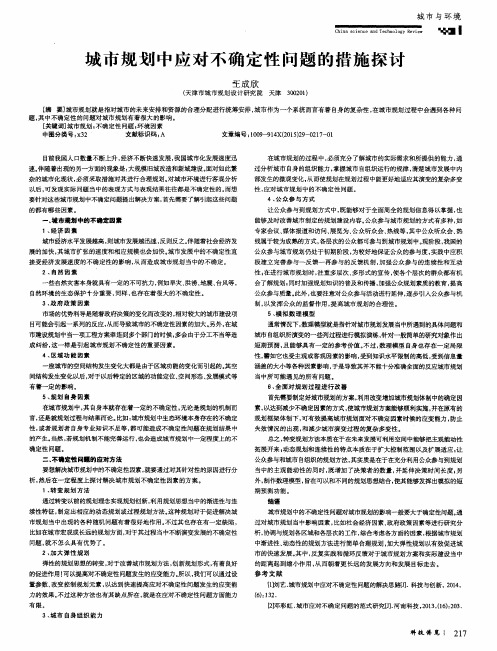
接受经济发展速度的不确定性的影响 , 从而造成城市规划当中的不确定 。
2、 自然 因 素
一
些 自然灾 害本 身就 具有 一定 的不可抗 力 , 例如旱 灾 、 洪涝、 地震 、 台风 等 ,
自然环 境 的生态 保 护十分 重 要 , 同样 , 也存 在着 很大 的不 确定 性 。
极 建立 完 善参 与一 反 馈一 再参 与 的反 馈机 制 , 加 强公众 参 与 的连 续性 和互 动 性; 在进 行城 市规划 时 , 注 重多层 次 、 多 形式 的宣传 , 使 各个层 次 的群众 都有 机 会了解 规划 ; 同时加 强规 划知识 的普及 和传播 , 加 强公众规 划 素质 的教 育 , 提 高 公 众参 与质量 。 此外, 也 要注意 对公众 参与活 动进 行延伸 , 逐步 引入 公众参 与机 制, 以发 挥 公众 的监督 作用 , 提 高 城市 规划 的 合理性 。
性, 譬如它也受主观或客观因素的影响 , 受到知识水平限制的高低, 受到信息量
涵 盖 的大 小等 各种 因素 影 响 , 于 是导致其 并不 能十分 准确全面 的反 应城市 规划 当 中所 可 能遇 见 的所有 问题 。 6、 全 面 对规 划 过 程进 行改 善
座 城市 的空间结 构发生 变化大都 是 由于 区域功 能的变 化而引起 的 。 其空
3、 政府 政 策 因 素
市场的优势利导是随着政府决策的变化而改变的, 相对较大的城市建设项
目可能会 引起一 系列 的反应 , 从 而导致 城市 的不确定性 因素 的加大 。 另外, 在 城 市 建设规 划 中当一项 工程方 案牵连到 多个 部门 的时候 , 多会 由于分工 不当等 造 成 纠纷 , 这一样 是 引起 城 市规划 不 确定 性的 重要 因素 。
城市规划应对不确定性问题的范式
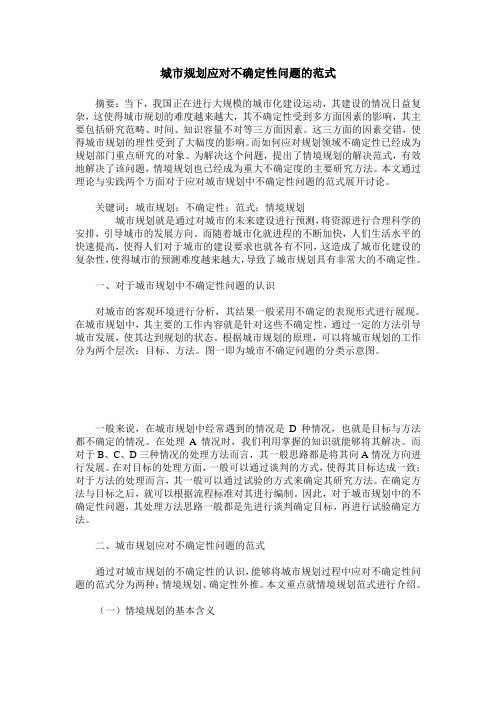
城市规划应对不确定性问题的范式摘要:当下,我国正在进行大规模的城市化建设运动,其建设的情况日益复杂,这使得城市规划的难度越来越大,其不确定性受到多方面因素的影响,其主要包括研究范畴、时间、知识容量不对等三方面因素。
这三方面的因素交错,使得城市规划的理性受到了大幅度的影响。
而如何应对规划领域不确定性已经成为规划部门重点研究的对象。
为解决这个问题,提出了情境规划的解决范式,有效地解决了该问题,情境规划也已经成为重大不确定度的主要研究方法。
本文通过理论与实践两个方面对于应对城市规划中不确定性问题的范式展开讨论。
关键词:城市规划;不确定性;范式;情境规划城市规划就是通过对城市的未来建设进行预测,将资源进行合理科学的安排,引导城市的发展方向。
而随着城市化就进程的不断加快,人们生活水平的快速提高,使得人们对于城市的建设要求也就各有不同,这造成了城市化建设的复杂性,使得城市的预测难度越来越大,导致了城市规划具有非常大的不确定性。
一、对于城市规划中不确定性问题的认识对城市的客观环境进行分析,其结果一般采用不确定的表现形式进行展现。
在城市规划中,其主要的工作内容就是针对这些不确定性,通过一定的方法引导城市发展,使其达到规划的状态。
根据城市规划的原理,可以将城市规划的工作分为两个层次:目标、方法。
图一即为城市不确定问题的分类示意图。
一般来说,在城市规划中经常遇到的情况是D种情况,也就是目标与方法都不确定的情况。
在处理A情况时,我们利用掌握的知识就能够将其解决。
而对于B、C、D三种情况的处理方法而言,其一般思路都是将其向A情况方向进行发展。
在对目标的处理方面,一般可以通过谈判的方式,使得其目标达成一致;对于方法的处理而言,其一般可以通过试验的方式来确定其研究方法。
在确定方法与目标之后,就可以根据流程标准对其进行编制。
因此,对于城市规划中的不确定性问题,其处理方法思路一般都是先进行谈判确定目标,再进行试验确定方法。
二、城市规划应对不确定性问题的范式通过对城市规划的不确定性的认识,能够将城市规划过程中应对不确定性问题的范式分为两种:情境规划、确定性外推。
城市规划应对不确定性问题的分析
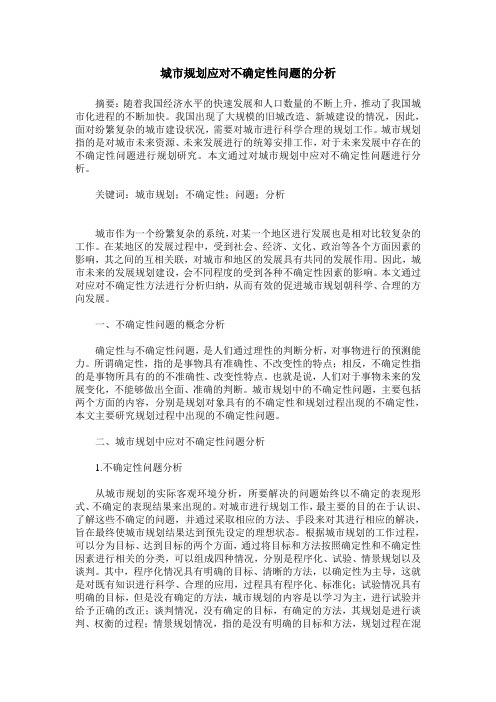
城市规划应对不确定性问题的分析摘要:随着我国经济水平的快速发展和人口数量的不断上升,推动了我国城市化进程的不断加快。
我国出现了大规模的旧城改造、新城建设的情况,因此,面对纷繁复杂的城市建设状况,需要对城市进行科学合理的规划工作。
城市规划指的是对城市未来资源、未来发展进行的统筹安排工作,对于未来发展中存在的不确定性问题进行规划研究。
本文通过对城市规划中应对不确定性问题进行分析。
关键词:城市规划;不确定性;问题;分析城市作为一个纷繁复杂的系统,对某一个地区进行发展也是相对比较复杂的工作。
在某地区的发展过程中,受到社会、经济、文化、政治等各个方面因素的影响,其之间的互相关联,对城市和地区的发展具有共同的发展作用。
因此,城市未来的发展规划建设,会不同程度的受到各种不确定性因素的影响。
本文通过对应对不确定性方法进行分析归纳,从而有效的促进城市规划朝科学、合理的方向发展。
一、不确定性问题的概念分析确定性与不确定性问题,是人们通过理性的判断分析,对事物进行的预测能力。
所谓确定性,指的是事物具有准确性、不改变性的特点;相反,不确定性指的是事物所具有的的不准确性、改变性特点。
也就是说,人们对于事物未来的发展变化,不能够做出全面、准确的判断。
城市规划中的不确定性问题,主要包括两个方面的内容,分别是规划对象具有的不确定性和规划过程出现的不确定性,本文主要研究规划过程中出现的不确定性问题。
二、城市规划中应对不确定性问题分析1.不确定性问题分析从城市规划的实际客观环境分析,所要解决的问题始终以不确定的表现形式、不确定的表现结果来出现的。
对城市进行规划工作,最主要的目的在于认识、了解这些不确定的问题,并通过采取相应的方法、手段来对其进行相应的解决,旨在最终使城市规划结果达到预先设定的理想状态。
根据城市规划的工作过程,可以分为目标、达到目标的两个方面,通过将目标和方法按照确定性和不确定性因素进行相关的分类,可以组成四种情况,分别是程序化、试验、情景规划以及谈判。
不确定性视角下的城市总体规划评估研究——以无锡城市总体规划评估为例的开题报告
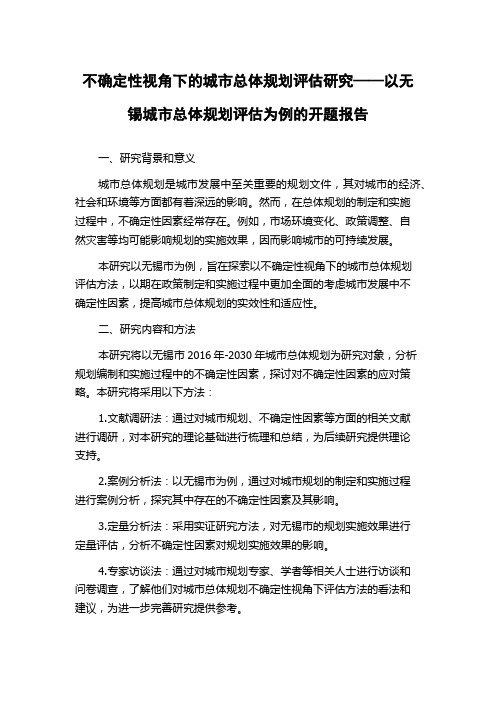
不确定性视角下的城市总体规划评估研究——以无锡城市总体规划评估为例的开题报告一、研究背景和意义城市总体规划是城市发展中至关重要的规划文件,其对城市的经济、社会和环境等方面都有着深远的影响。
然而,在总体规划的制定和实施过程中,不确定性因素经常存在。
例如,市场环境变化、政策调整、自然灾害等均可能影响规划的实施效果,因而影响城市的可持续发展。
本研究以无锡市为例,旨在探索以不确定性视角下的城市总体规划评估方法,以期在政策制定和实施过程中更加全面的考虑城市发展中不确定性因素,提高城市总体规划的实效性和适应性。
二、研究内容和方法本研究将以无锡市2016年-2030年城市总体规划为研究对象,分析规划编制和实施过程中的不确定性因素,探讨对不确定性因素的应对策略。
本研究将采用以下方法:1.文献调研法:通过对城市规划、不确定性因素等方面的相关文献进行调研,对本研究的理论基础进行梳理和总结,为后续研究提供理论支持。
2.案例分析法:以无锡市为例,通过对城市规划的制定和实施过程进行案例分析,探究其中存在的不确定性因素及其影响。
3.定量分析法:采用实证研究方法,对无锡市的规划实施效果进行定量评估,分析不确定性因素对规划实施效果的影响。
4.专家访谈法:通过对城市规划专家、学者等相关人士进行访谈和问卷调查,了解他们对城市总体规划不确定性视角下评估方法的看法和建议,为进一步完善研究提供参考。
三、预期研究成果本研究力求通过以不确定性视角下的城市总体规划评估方法的探索,为城市规划制定和实施提供新的理论和方法支持,增强城市规划的可持续发展性。
预期研究成果如下:1.建立不确定性视角下的城市总体规划评估方法体系,为城市规划的制定和实施提供理论指导。
2.全面分析无锡市总体规划中存在的不确定性因素及其影响,为政府部门制定相关政策提供参考。
3.通过实证研究,定量评估无锡市总体规划的实施效果,提出对策措施,为无锡市未来规划实施提供参考。
4.探究城市规划专家、学者等相关人士对不确定性视角下的城市总体规划评估方法的看法和建议,为进一步完善研究提供参考。
城市规划决策中不确定性的认知及应对方法

第42卷第14期山西建筑Vol.42No.142 0 16 年5 月SHANXI ARCHITECTURE May. 2016•规划•延&•文章编号:1009-6825 (2016) 14-0001 -02城市规划决策中不确定性的认知及应对方法贺关平(大宁县住房保障和城乡建设管理局,山西大宁042300)摘要:通过引入决策科学中有关不确定性的研究结果,探讨了城市规划决策中不确定性的根源、分类和特点,并分析了应对我国 城市规划决策中不确定性的关键方法,使城市规划有效引导城市健康有序的发展。
关键词:城市规划,不确定性,决策方法中图分类号:TU984 文献标识码:A1研究背景中国经济在近30年的发展中发生了飞跃式的变化,由原来 的计划经济时代已经完全转变为市场经济。
在经济发展的同时 中国城市规划中的“未来导向”型的规划决策也在发生着改变,由原来的引领到现在实施都备受质疑,因此在规划界中规划失效问 题已成为学科内的重点研究课题。
在研究和实施过程中,规划师 们逐渐意识到,当城市规划的理论面对一个城市时,是一个复杂 而又繁琐的系统,在规划决策实施过程中必不可少的会存在诸多 不确定性。
如何正确认知城市规划在决策过程中的不确定性,并 及时改变城市规划在城市主体中的决策方式,让城市规划能有效 的引导城市健康有序的发展,将成为城市规划研究理论的重要方 向之一。
本文认为城市规划决策在其收集信息、判断情况、选择 方案、制定政策、付诸实施等全过程中,存在着诸多不确定性,本 文旨在简略分析城市规划决策中的不确定性,同时提出可供借鉴 的决策方法。
2城市规划决策中不确定性研究的必然性2.1 城市规划本质上的未来导向性城市规划决策中“未来导向”理念具有重要意义。
其包含两方 面的含义:一是任何规划方针都是针对未来时期的,是趋向于某一 未来目标的;二是规划的内容和过程都是围绕实现未来目标而要 采取的行动而展开的,引导未来的行动来实现规划所确定的目标。
旅游城市的不确定性多目标环境规划优化模型框架研究_陈冰
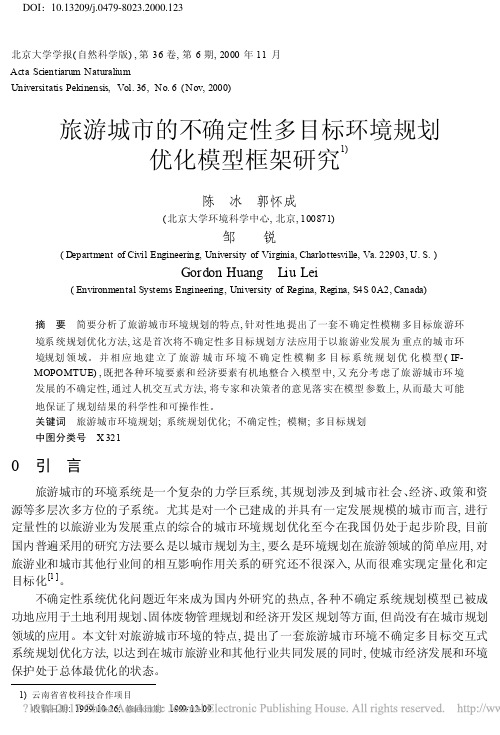
北京大学学报 ( 自然科学版 ) , 第 36 卷 , 第 6 期 , 2000 年 11 月 Acta Scientiarum Naturalium Universitatis Pekinensis, Vol. 36, No. 6 ( Nov, 2000)
11 1
综合性
城市旅游业覆盖范围广, 既包括工业发达的、 以公园绿地为主要旅游点的城区, 也包括农
业发达、 以自然景观为主要旅游点的城市郊区 , 其环境经济系统是个复杂的巨系统, 它由旅游 业、 旅游相关产业、 所在区域其他行业、 旅游资源、 水资源、 大气环境及生态环境等众多子系统 构成统一体, 从而完成系统的功能。
p + 1, p + 2, , , n 时 , x j \ 0, x j I X 为区间数 0~ 1 整数变量 。 当模型中的一些不确定性参数可以赋予隶属函数时, 则该模型就形成了不确定性模糊多 目标规划问题。在本研究中, 采用 IF LP 算法将不确定性多目标问题转化为确定性问题的形 式, 即把目标函数和约束条件左边的系数作为不确定数处理 , 而对系统模糊目标和约束条件右 边项赋予线性隶属函数。 21 11 2 旅游城市环境不确定性模糊多目标规划系统模型 基于上述不确定性多目标混合整数规划模型的一般形式 , 结合对城市旅游业及其环境经 济系统的系统分析后 , 可以得出以社会总体经济收益最大化、 城市宏观经济结构最优化、 旅游 业经济收益最大化、 环境污染最小化等目标, 以及用地面积、 环境容量、 水资源量等约束条件 , 最后得到实际的旅游城市环境不确定性模糊多目标规划系统模型。 设某城市圈按空间、 功能分异划分为 N 个子区 ; 将规划年限划为 M 个阶段 , 设待选行业 有 G 个; 则针对该旅游城市的环境经济系统规划 IFMOPOMTUE 模型的框架为 : ( 1) 目标函数 ¹ 社会总体经济收益最大化目标 max F 1 =
城市规划应对不确定性问题的范式研究

d sr t n sbet e u g n dojcie om eci i ,ujcv d met n bet r po i j a vn
e p o a i n o e so ln i g a d p o e s ln ig x lr to , n —t p p a n n n r c s a n n , p a d s o tt r c n t c i n g i a c n o iy n h r—e m o sr t u d n e a d p l u o c i a ta s s me t Co a e t h r d t na mp c s e s n . mp r d wi t e ta ii l h o p a n n , e s e a i ln i g c n g e t n a c ln i g t c n ro p a n n a r a l e h n e h y
KEYW O RDS:u c ran y;s e a i l n i g n e t it c n ro p a n n ;
u b npa ig p rdg r a ln n ; a a i m
面的 区别 。情景规 划方法应 用在城市规 划中 ,与 传 统城 市规划相比 ,可以有效地提 高规 划决策的
践 两 个 层 面 ,对 比 分 析 了传 统 的确 定 性 方 法 主 导
下的城市规划 与情 景规 划主导下 的城 市规 划的异
同 :首 先 在 认 识 论 、 基 本 原 理 和 工 作 方 法 上存 在
明显差别 ;其 次在城 市规划编制 实践 中,存 在单 因素 分析 与多驱动 力分析、单方案预 测与多情景 描 述、主观判 断与客观 规律 发掘 、一 站式规划与
适应性 、灵活性和有效性 。 【 关键 词 】 不 确 定性 ; 情 景 规 历 着大规模 的城 市化运动 旧城改
城市规划应对不确定性问题的范式研究

城市规划应对不确定性问题的范式研究摘要:现如今,我国的城市化进程仍在稳步推进,改造和建设是我国城市发展的主旋律。
在城市不断进步的过程中,城市人口和用地将产生极大的变动,这些变动都不是规划者能够预先想到的。
而且,城市的发展进程不只是一个独立概念,而是的和人类发展和自然环境之间的一种平衡,这样,城市的规划就存在了一定的挑战,本文就将在这一背景下对城市规划所应对的不确定性范式加探讨。
关键词:城市规划;城市建设;不确定性引言所谓城市规划,就是对城市以后使用的资源进行统筹。
城市规划师对城市以后几十年的远景和城市发展方向做出判断,在这一行为中使用了诸多理论和方式对未来做出预见和探析。
随着科学技术的成熟和完善,对未来发展趋势模型进行预见也越来越复杂。
这种思维范式即为在确定型基础上构建出的精确预测。
城市的未来是怎样的?有多大几率会成为这样?这些确定型的思路植根在人类对于知识和历史规律的把握以及更加科学的预测手段上。
不过这样的“问题引导型”思考方式也会对我们的在未来层面上的判断。
人类对于喜好、价值和期盼的领悟随思考氛围的变更而出现差别,所以,情境的构筑是拓展人类有关认知的有效手段,情境规划让人们对城市规划的理解有了本质上的变革,很多以前被忽略的问题开始暴露出来。
一、概述关于范式,以库恩的解释是“制订的科学共同体进行某种科学行为所需要遵循的‘方式’它包含着共有的标准、理论、范例、手段以及世界观等所有和科学研究相关的元素。
”自上世纪60年代后,范式的含义就是思维模式和方式了。
现如今我国的正在不断推行城市化,旧城市建筑的改造和新城市的建设部署是城市发展的一大元素。
在城市化发展过程里。
城市中人类和用地指标会产生比较大的波动,而且城市也并不是一个封闭环境,它处在人类社会和大自然两个系统的共同作用下,也受到两个系统的影响,换而言之,人类所有的技术进步、发展形式的变化都受其掌控。
这些因素里有不少我们只能看到却不能预见未来的元素,而它们则使得以后的城市规划有着更多的不确定,这就成为了城市规划所要面对的挑战,在下文中就将针对这些不确定性进行讨论。
城市规划应对不确定性问题论文

城市规划应对不确定性问题论文【摘要】城市规划是指对未来世界的预测,选择城市发展的途径,但是,未来世界存在很对不确定性因素,做好城市规划,并应对不确定性因素,采用情境规划方法,从而减少未来的不确定因素。
城市规划是指对城市经济发展统筹规划、统筹安排,选择城市的未来发展途径,随着我国城市化建设进程的加快步伐,城市的发展面临着各种各样的不确定性问题,针对这些不确定性问题,应做好应对不确定性问题的城市规划措施,从而为城市居民提供住房保障。
一、城市发展所面临的不确定问题分析城市发展中的不确定问题是当前国家、政府需要解决的重要任务,城市发展不确定性问题主要包括环境污染、技术进步等问题,对于城市环境问题的分析,在城市规划中,应采取有效的措施,通过一定的方法和路径指导,做出科学、合理的城市规划,从而实现城市规划的理想状态目标。
根据城市规划的工作方法、实现目标、确定性和不确定性情况分析,可以把城市规划的不确定问题分为四类:1、明确目标、工作方法思路清晰,充分利用城市规划的工作原理知识,使确定性占主导地位,以标准化、程序化的方法为主;2、目标明确、不确定方法,则规划通过不断尝试和探索,从而找出正确方法;3、方法明确、目标不确定,这类情况是整个规划所表现出来的权衡、商务谈判等过程;4、目标不确定、方法不确定,这类情况是城市规划的找寻过程,其也被称为情境规划。
城市规划不确定问题基本上就是按照上面四类进行分类的,其属于理想状态划分,在现实生活中,不可能按照理想状态进行不确定问题的划分,通常采用相互交叉的方式来进行不同情况的划分,使城市发展的技术、目标等划分为不同的情况。
一般情况下,第四类目标不确定、方法不确定问题是实际应用中面临最多的问题,将技术防范划分为已知、未知,针对不同情况不同分析,虽然一些技术方法在这个城市发展中有效,但并不代表在其他城市规划中有效,由此可知,已知的技术方法中还存在未知的因素。
二、针对城市发展的不确定问题,城市规划应对不确定性问题研究范式(一)城市规划应对不确定性问题可以分为确定性外推、情境规划等两种范式,对于确定性外推,其是城市发展的客观环境因素,但是这种不确定性需要遵循城市规划的发展规律,即将过去的城市规划经验应用到未来的城市发展中。
探讨城市规划中如何应对其不确定性因素
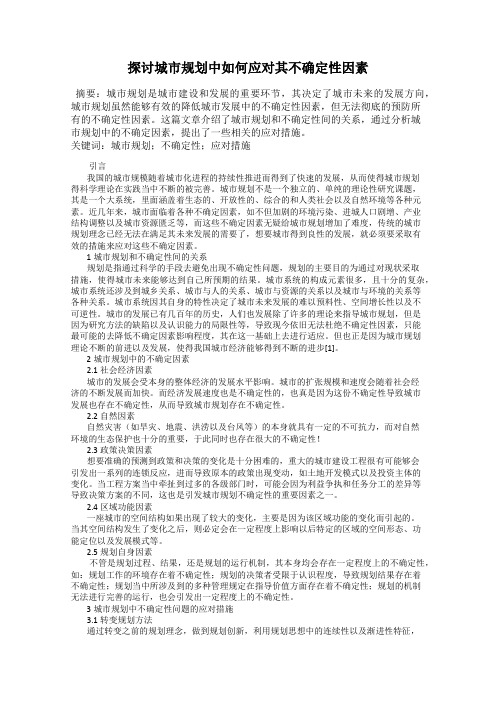
探讨城市规划中如何应对其不确定性因素摘要:城市规划是城市建设和发展的重要环节,其决定了城市未来的发展方向,城市规划虽然能够有效的降低城市发展中的不确定性因素,但无法彻底的预防所有的不确定性因素。
这篇文章介绍了城市规划和不确定性间的关系,通过分析城市规划中的不确定因素,提出了一些相关的应对措施。
关键词:城市规划;不确定性;应对措施引言我国的城市规模随着城市化进程的持续性推进而得到了快速的发展,从而使得城市规划得科学理论在实践当中不断的被完善。
城市规划不是一个独立的、单纯的理论性研究课题,其是一个大系统,里面涵盖着生态的、开放性的、综合的和人类社会以及自然环境等各种元素。
近几年来,城市面临着各种不确定因素,如不但加剧的环境污染、进城人口剧增、产业结构调整以及城市资源匮乏等,而这些不确定因素无疑给城市规划增加了难度,传统的城市规划理念已经无法在满足其未来发展的需要了,想要城市得到良性的发展,就必须要采取有效的措施来应对这些不确定因素。
1城市规划和不确定性间的关系规划是指通过科学的手段去避免出现不确定性问题,规划的主要目的为通过对现状采取措施,使得城市未来能够达到自己所预期的结果。
城市系统的构成元素很多,且十分的复杂,城市系统还涉及到城乡关系、城市与人的关系、城市与资源的关系以及城市与环境的关系等各种关系。
城市系统因其自身的特性决定了城市未来发展的难以预料性、空间增长性以及不可逆性。
城市的发展已有几百年的历史,人们也发展除了许多的理论来指导城市规划,但是因为研究方法的缺陷以及认识能力的局限性等,导致现今依旧无法杜绝不确定性因素,只能最可能的去降低不确定因素影响程度,其在这一基础上去进行适应。
但也正是因为城市规划理论不断的前进以及发展,使得我国城市经济能够得到不断的进步[1]。
2城市规划中的不确定因素2.1社会经济因素城市的发展会受本身的整体经济的发展水平影响。
城市的扩张规模和速度会随着社会经济的不断发展而加快。
城市规划应对不确定性问题的探讨
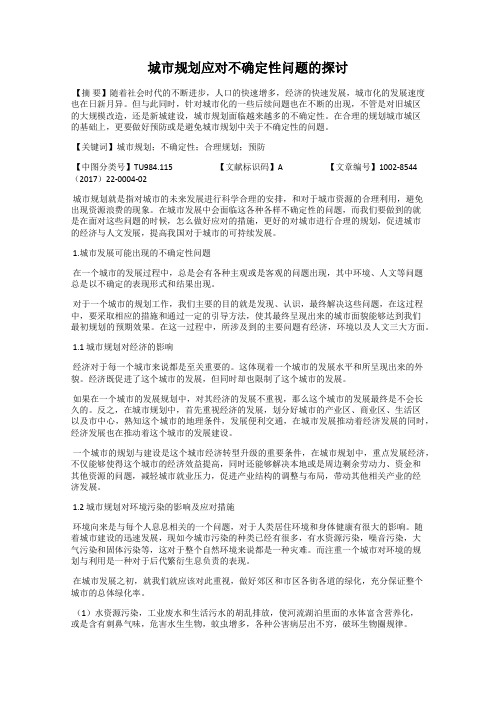
绿色植物能够吸音,因此在一些居民的居住区域要多增加绿化的覆盖率,在一些产业区的附近更是可以种植绿化带,能够有效的隔离噪音。
1.1城市规划对经济的影响
经济对于每一个城市来说都是至关重要的。这体现着一个城市的发展水平和所呈现出来的外貌。经济既促进了这个城市的发展,但同时却也限制了这个城市的发展。
如果在一个城市的发展规划中,对其经济的发展不重视,那么这个城市的发展最终是不会长久的。反之,在城市规划中,首先重视经济的发展,划分好城市的产业区、商业区、生活区以及市中心,熟知这个城市的地理条件,发展便利交通,在城市发展推动着经济发展的同时,经济发展也在推动着这个城市的发展建设。
文献参考
[1]李峰.城市规划中的不确定性研究初探[J].同济大学,2008-03-01.
[2]李超楠.面向绿色基础设施的城市规划弹性研究[J].大连理工大学,2014-06-02.
[3]刘丹.弹性城市的规划理念与方法研究[J].浙江大学,2015-12-01.
居住环境影响着人们对于这个城市的好感度,不仅是对于身体健康有利,对于心理健康同样也起着重要的作用。更是体现了人与人、人与自然和谐共存的观念,这种观念反映了千百年来社会上表现出来的“天人合一”的规划理念。
而城市规划在初期对于公共设施的建设也显得尤为重要,现代的人们随着经济的发展,不再是单纯的追逐于吃饱穿暖这一点上,更多的是注重于更高一层面上的精神追求。这包括了身体素质的追求,精神文化的追求以及对于心理上的满足。这就需要我们在建设初期就要充分考虑到公共设施的建设,比如公园、图书馆、商场等的建设。在赐基础上对于城市的资源规划进行合理的统筹分配。
我国城市规划中不确定性问题的应对方法
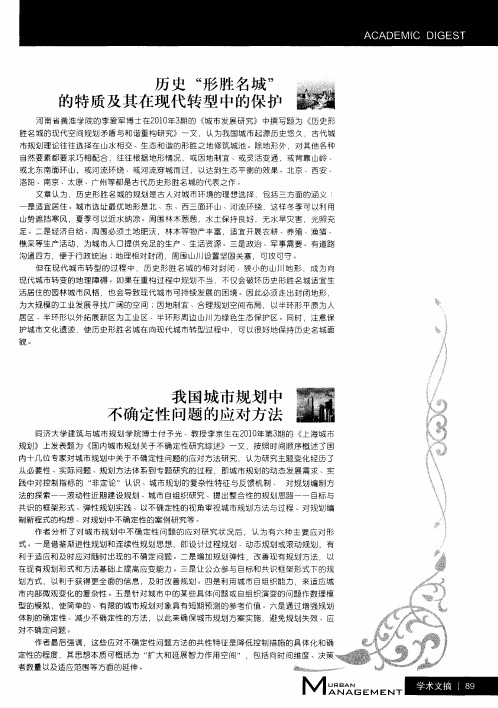
我 国城 市 规划 中 不 确 定 性 问题 的 应对 方 法
同 济 大 学 建 筑 与 城 市 规 划 学 院 博 士 付 予 光 、教 授 李 京 生 在 2 1 年 第3 的 《 海 城 市 00 期 上 规 划 》 上 发表 题 为 《 内城 市 规 划 关 于 不 确 定 性 研 究 综 述 》 一 文 ,按 照 时 间顺 序 概 述 了国 。 国 . 内十 几 位 专 家 对 城 市 规 划 中关 于 不 确 定 性 问题 的 应 对 方 法 研 究 ,认 为 研 究 主 题 变 化 经 历 了
活居住的园林城市风格 ,也会导致现 代城市可持续发展 的困境 。因此必须 走出封闭地形 , 为大规模的工业发展寻 找广阔的空 间 : 因地制宜 、合理规 划空间布局 以半环形平原 为人 居区 、半环形 以外拓展 新区为工业 区 、半环形周边 山川 为绿色生态保护 区 。同时 注意保
护城 市 文 化 遗 迹 ,使 历 史 形 胜 名 城 在 向 现 代 城 市 转 型 过 程 中 ,可 以很 好 地 保 持 历 史 名 城 面
式 。一是借鉴 渐进性规划和连续 性规划思想 ,即设 计过程规划 、动 态规划或滚动规划 ,有
利于适应和及 时应对随日 寸出现 的 不 确 定 f 题 。二 是 增 加 规 划 弹 性 , 改 善 现 有 o 3
Hale Waihona Puke 在现有规划形 式和 方法基础上提 高应变能力 。三是让公众参与 目标和 共识框
划 方 式 , 以利 于获 得 更 全 面 的 信 息 ,及 时 改 善 规 划 。四 是 利 用 城 市 自组 织 能 市 内 部 微 观 变 化 的 复 杂 性 。五 是 针 对 城 市 中的 某 些 具 体 问 题 或 自组 织 演 变 的
城市规划应对不确定性问题的范式研究 张霖 夏昱
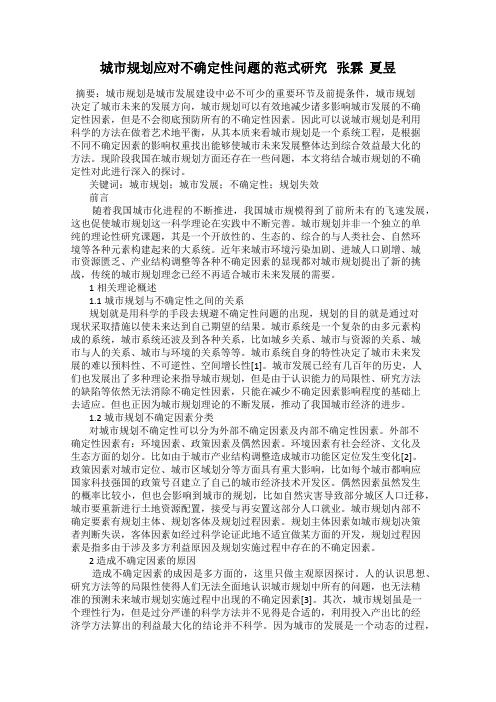
城市规划应对不确定性问题的范式研究张霖夏昱摘要:城市规划是城市发展建设中必不可少的重要环节及前提条件,城市规划决定了城市未来的发展方向,城市规划可以有效地减少诸多影响城市发展的不确定性因素,但是不会彻底预防所有的不确定性因素。
因此可以说城市规划是利用科学的方法在做着艺术地平衡,从其本质来看城市规划是一个系统工程,是根据不同不确定因素的影响权重找出能够使城市未来发展整体达到综合效益最大化的方法。
现阶段我国在城市规划方面还存在一些问题,本文将结合城市规划的不确定性对此进行深入的探讨。
关键词:城市规划;城市发展;不确定性;规划失效前言随着我国城市化进程的不断推进,我国城市规模得到了前所未有的飞速发展,这也促使城市规划这一科学理论在实践中不断完善。
城市规划并非一个独立的单纯的理论性研究课题,其是一个开放性的、生态的、综合的与人类社会、自然环境等各种元素构建起来的大系统。
近年来城市环境污染加剧、进城人口剧增、城市资源匮乏、产业结构调整等各种不确定因素的显现都对城市规划提出了新的挑战,传统的城市规划理念已经不再适合城市未来发展的需要。
1相关理论概述1.1城市规划与不确定性之间的关系规划就是用科学的手段去规避不确定性问题的出现,规划的目的就是通过对现状采取措施以使未来达到自己期望的结果。
城市系统是一个复杂的由多元素构成的系统,城市系统还波及到各种关系,比如城乡关系、城市与资源的关系、城市与人的关系、城市与环境的关系等等。
城市系统自身的特性决定了城市未来发展的难以预料性、不可逆性、空间增长性[1]。
城市发展已经有几百年的历史,人们也发展出了多种理论来指导城市规划,但是由于认识能力的局限性、研究方法的缺陷等依然无法消除不确定性因素,只能在减少不确定因素影响程度的基础上去适应。
但也正因为城市规划理论的不断发展,推动了我国城市经济的进步。
1.2 城市规划不确定因素分类对城市规划不确定性可以分为外部不确定因素及内部不确定性因素。
如何应对规划方案中的不确定性与变化

如何应对规划方案中的不确定性与变化在当今快速变化的社会环境中,规划方案的不确定性与变化成为了一个普遍存在的问题。
无论是个人的职业规划,还是组织的战略规划,都需要面对各种不确定性因素和变化情况。
在这篇文章中,我们将探讨如何应对规划方案中的不确定性与变化,并提供一些实用的方法和策略。
一、认识不确定性与变化不确定性与变化是现代社会的常态。
无论是技术的进步、市场的竞争、政策的变动,还是自然灾害等外部因素,都可能对规划方案产生影响。
同时,内部因素如组织结构的调整、人员变动等也会导致规划方案的不确定性与变化。
因此,我们需要正确认识不确定性与变化的本质,并做好应对的准备。
不确定性是指未来发展的不可预知性。
在规划方案中,不确定性表现为无法准确预测的外部环境因素的变化,以及内部因素的不稳定性。
变化则是指规划方案在实施过程中可能发生的调整和变动。
二、灵活性与适应性面对不确定性与变化,最重要的是保持灵活性与适应性。
灵活性是指能够随时调整规划方案以适应新的情况。
适应性则是指能够根据不同的环境变化做出相应的调整。
只有具备了这两个能力,才能在不确定性与变化中保持竞争优势。
为了增强灵活性与适应性,我们可以采取以下策略:1.建立灵活的决策机制:规划方案的实施需要决策,而灵活的决策机制可以更快地响应变化。
可以采用分权决策的方式,让更多的人参与决策过程,减少决策的层级,提高决策的效率。
2.持续学习与创新:不断学习和创新是应对不确定性与变化的重要手段。
通过学习新知识和技能,提高自身的适应能力;通过创新思维,寻找新的解决方案。
组织可以设立专门的学习和创新机构,鼓励员工参与学习和创新活动。
3.建立弹性供应链:供应链的弹性可以帮助组织更好地应对市场的变化。
建立多元化的供应渠道,与多个供应商建立合作关系,可以减少对单一供应商的依赖,降低风险。
4.建立快速反应机制:规划方案的实施过程中,需要建立快速反应机制,及时发现并解决问题。
可以设立专门的项目管理团队,负责监控项目进展,及时调整方案。
国内城市规划关于不确定性研究综述
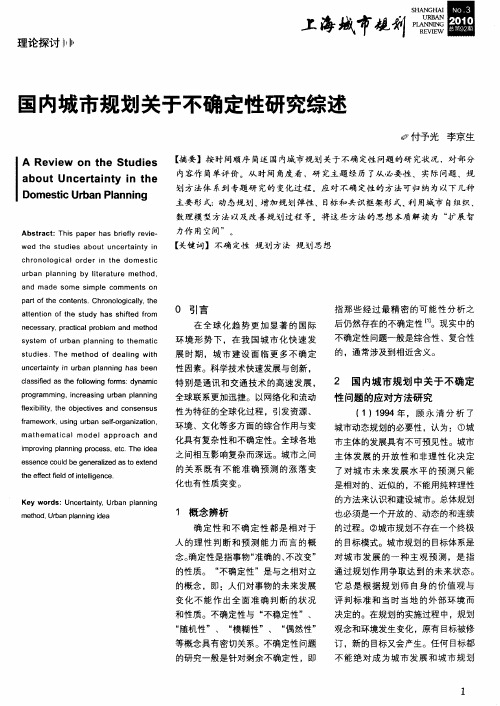
市主体的发展具有不可预见性。城市 主体发 展的开放 性和非理 性化决定 了对城 市未来发 展水平 的预测只能
是 相对 的 、近似 的 ,不 能用 纯粹 理 性 的方法 来认 识 和建 设城 市 。总体 规 划 也 必须 是一 个 开放 的 、动态 的和 连续
m tdU apnn ia eo r nlng e h b a i d
1 概念辨析
确 定性和 不确定 性都 是相对 于 人 的理性 判断和预 测能 力而言 的概 念。 确定性是指事物“ 准确的、 不改变” 的性质 。 “ 不确定性”是与之相对立
的过程。②城市规划不存在一个终极 的 目标模式。城市规划的目标体系是 对城市 发展 的一 种主 观预测 ,是指 通过规划作 用争取达到 的未来状态。 它总是 根据规划 师 自身的价值观 与 评 判标 准和 当时 当地 的外部环境 而 决定 的。在规划的实施过程 中,规划 观念和环境发生变化,原有 目标被修 订 ,新的 目标又会产生。任何 目标都
te h
a t i he sudy has shfed fOm tent on oft t it r n c s r ,p a t al obem nd m e h d e es a y r ci c pr l a to s st y em u ban pl of r anni t t em atc ng o h i s udi t es.Th m et e hod of dealn wih ig t u erant n r n pt nc t i y i u ba ann n as be i g h en ca sie s te fl wig f r s: n m i ls f d a h ol n om i o dy a c pogr mig,i r asn r n pan n r am n nc e ig u ba l nig
面对城市发展不确定的公交规划方法研究
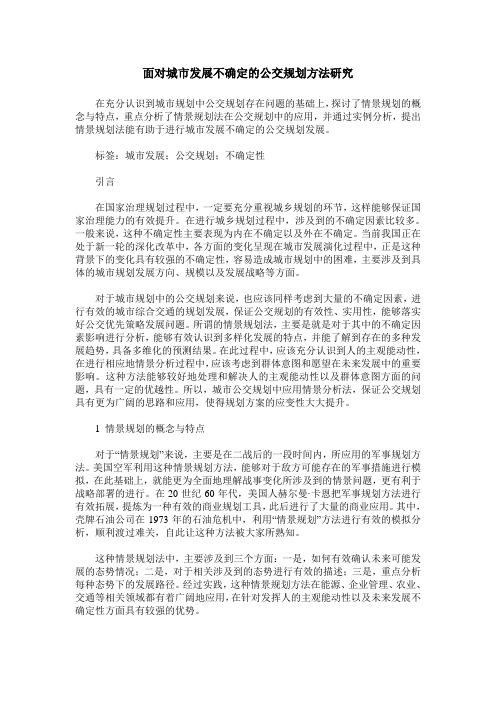
面对城市发展不确定的公交规划方法研究在充分认识到城市规划中公交规划存在问题的基础上,探讨了情景规划的概念与特点,重点分析了情景规划法在公交规划中的应用,并通过实例分析,提出情景规划法能有助于进行城市发展不确定的公交规划发展。
标签:城市发展;公交规划;不确定性引言在国家治理规划过程中,一定要充分重视城乡规划的环节,这样能够保证国家治理能力的有效提升。
在进行城乡规划过程中,涉及到的不确定因素比较多。
一般来说,这种不确定性主要表现为内在不确定以及外在不确定。
当前我国正在处于新一轮的深化改革中,各方面的变化呈现在城市发展演化过程中,正是这种背景下的变化具有较强的不确定性,容易造成城市规划中的困难,主要涉及到具体的城市规划发展方向、规模以及发展战略等方面。
对于城市规划中的公交规划来说,也应该同样考虑到大量的不确定因素,进行有效的城市综合交通的规划发展,保证公交规划的有效性、实用性,能够落实好公交优先策略发展问题。
所谓的情景规划法,主要是就是对于其中的不确定因素影响进行分析,能够有效认识到多样化发展的特点,并能了解到存在的多种发展趋势,具备多维化的预测结果。
在此过程中,应该充分认识到人的主观能动性,在进行相应地情景分析过程中,应该考虑到群体意图和愿望在未来发展中的重要影响。
这种方法能够较好地处理和解决人的主观能动性以及群体意图方面的问题,具有一定的优越性。
所以,城市公交规划中应用情景分析法,保证公交规划具有更为广阔的思路和应用,使得规划方案的应变性大大提升。
1 情景规划的概念与特点对于“情景规划”来说,主要是在二战后的一段时间内,所应用的军事规划方法。
美国空军利用这种情景规划方法,能够对于敌方可能存在的军事措施进行模拟,在此基础上,就能更为全面地理解战事变化所涉及到的情景问题,更有利于战略部署的进行。
在20世纪60年代,美国人赫尔曼·卡恩把军事规划方法进行有效拓展,提炼为一种有效的商业规划工具,此后进行了大量的商业应用。
【城市规划论文】不确定性理论及规划研究

不确定性理论及规划研究作者:文/郭庆军引言当今世界处在一个信息时代。
信息是人类认识世界和改造世界的知识源泉。
人们接触到的各种各样的信息有时候是确定的,更多的时候是不确定的。
比如,自然界中普遍存在着各种定的息可出来性的杂,求处方法了各着人确定含有规划求。
应用多属能够着计算法任务角度期望变量考虑信水和不不确定现象;经济生活中伴随着大量的不确定信息,股票证券或期货市场总是处在不确波动状态;某些传染性疾病的传播过程中有诸多不确定因素。
在现实世界中,不确定信谓无处不在,而信息不确定性的表现又是五彩缤纷的。
一、不确定性问题关于不确定性的问题,早在1936年凯恩斯(J.N.Keynes)在他的《通论》中就已经提了。
雷?温特劳布教授在其《论不确定性及凯恩斯革命》一文中,曾把凯恩斯对不确定看法看成“一次极其重要的革命”。
随着社会的发展、科学的进步,人们在科学研究中涉及的系统越来越庞大,越来越复不确定性的表现也越来越突出,经典的确定性描述方法变得无能为力,我们必须积极寻理不确定性的有效方法。
到目前为止,人们已经发现了四种不确定性信息:除概率统计研究的随机信息之外,人们又先后发现了模糊信息、灰色信息和未确知信息,并且已有自的描述方法。
二、现状分析在运筹学、管理科学、信息科学、系统科学、计算机科学以及工程等众多领域都存在为的或客观的不确定性,表现形式也多种多样,如随机性、模糊性、粗糙性以及多重不性。
伴随着这些不确定性,毫无疑问地存在着大量的不确定优化问题。
然而,对于这些不确定性的决策问题,经典的优化理论通常是无能为力的。
虽然已有的随机规划和模糊可以解决一部分不确定优化问题,但远远不能满足解决具有多重不确定性优化问题的需因此,建立和完善统一的不确定环境下的优化理论不但具有理论价值,而且具有广阔的前景。
由于客观事物的复杂性、不确定性以及人类思维的模糊性,近年来,对不确定环境下性决策方法的研究已引起了极大的关注,并取得了丰硕成果。
- 1、下载文档前请自行甄别文档内容的完整性,平台不提供额外的编辑、内容补充、找答案等附加服务。
- 2、"仅部分预览"的文档,不可在线预览部分如存在完整性等问题,可反馈申请退款(可完整预览的文档不适用该条件!)。
- 3、如文档侵犯您的权益,请联系客服反馈,我们会尽快为您处理(人工客服工作时间:9:00-18:30)。
15【摘要】在城市研究和规划实践中,发现现实世界充满不确定性,城市规划面临越来越多不确定性的考验。
传统确定性思维指导下的城市规划,存在着研究范畴不对等、知识容量不对等和时间上交错三方面的缺陷,影响了规划的理性。
情景规划以其合理的描述、广泛的参与、持续的监测更新很好地解决了上述问题,成为规划领域应对重大不确定性问题的主要方法。
本文从理论与实践两个层面,对比分析了传统的确定性方法主导下的城市规划与情景规划主导下的城市规划的异同:首先在认识论、基本原理和工作方法上存在明显差别;其次在城市规划编制实践中,存在单因素分析与多驱动力分析、单方案预测与多情景描述、主观判断与客观规律发掘、一站式规划与过程式规划、近期建设指导与策略影响评价五方面的区别。
情景规划方法应用在城市规划中,与传统城市规划相比,可以有效地提高规划决策的适应性、灵活性和有效性。
【关键词】不确定性;情景规划;城市规划;范式ABSTRACT: The world is full of uncertainty and urban planning is faced with more uncertainty in our research and practice. There are three de fi ciencies affecting the rationality of planning in the traditional certainty-oriented urban planning, which are mismatched study sphere, mismatched knowledge capacity, and mismatched work process. However, the scenario planning, owing to its reasonable description, wide participation, and continuous monitoring and updating in the process of planning, becomes the main method to deal with these problems. From the theoretical and practical perspectives, the paper compares and analyzes the differences between the two paradigms of urban planning – the traditional certainty-oriented planning and the uncertainty-oriented planning: fi rst, there are obvious disparity in terms of epistemology, fundamental principles, and work methods; second, in terms of practice,there are differences in the following five aspects – single factor analysis and multiple driving force analysis, single scheme prediction and multiple scenario description, subjective judgment and objective norm exploration, one-stop planning and process planning, and short-term construction guidance and policy impact assessment. Compared with the traditional planning, the scenario planning can greatly enhance the adaptability, fl exibility, and validity of planning decision-making.KEYWORDS: uncertainty; scenario planning; urban planning; paradigm1 引言我国正经历着大规模的城市化运动,旧城改造与新城建设此起彼伏,城市人口与城市建设用地变化剧烈,其幅度远远超出了我们的想象。
面对日益复杂的城市状况,城市规划预测20年后的城市发展显得力不从心。
同时,城市并不是一个封闭的子系统,它始终处于人类社会与自然界两大系统相互作用的进程中,并受两者的影响。
气候变暖、极端灾害、生态危机、环境污染、技术进步、人类发展模式的选择等都将影响城市的发展,都需要城市规划对此做出响应。
可见,世界的复杂性,未来的不确定性,对城市规划提出了巨大的挑战。
城市规划是对城市未来资源的统筹安排。
决策者与规划师判断城市未来愿景、选择城市发展路径,在此过程中应用了各种理论与方法对未来进行分析和预测。
随着认识的提高和技术的进步,预测未来发展趋势的模型越来越复杂。
这一城市规划应对不确定性问题的范式研究赫 磊 宋 彦 戴慎志【作者简介】赫 磊(1981-),男,同济大学建筑与城市规划学院和美国北卡罗莱纳大学教堂山分校城市与区域规划系联合培养博士研究生。
宋 彦(1973-),女,美国马里兰大学博士,北卡罗莱纳大学教堂山分校城市与区域规划系终身教授,北卡罗莱纳大学教堂山分校中国城市研究中心主任。
戴慎志(1956-),男,同济大学建筑与城市规划学院教授,博士生导师。
【修改日期】2012-06-28【文章编号】1002-1329 (2012)07-0015-08【中图分类号】TU984【文献标识码】A 城市规划应对不确定性问题的范式研究赫 磊 宋 彦 戴慎志RESEARCH ON THE PARADIGM OF URBAN PLANNING RESPONDING TO UNCERTAINTYHE Lei; SONG Yan; DAI ShenzhiP l a n n i n 城市规划 CITY PLANNING REVIEW2012年 第36卷 第7期 VOL.36 NO.7 JUL. 201216思维范式就是建立在确定性基础上的精确预测。
未来将会是什么样的?未来在多大概率下会是这样的?这种确定性思维根植于人类丰富的知识、对历史规律的把握和科学的预测方法。
但是这种“问题导向式”的思考模式将影响我们对未来不确定性的判断[1]:以已经掌握的事物为基础,形成关于价值、期望以及选择的优先级的认知,却无法了解未来情况下的这些认知将会是什么。
人们对于偏好、价值和期望的理解随着思考环境的转化而产生差异。
因此,情景的构建是扩展人们相关认知的有效工具。
情景规划使得人们对于城市问题的理解发生了根本性的变化,许多被忽视的问题浮现出来。
本文围绕城市规划中应对未来不确定性问题的两种思维范式与实践方法——(1)确定性预测(确定性外推法);(2)不确定性描述(情景规划法)——展开对比研究,从最根本的认识论出发,分析城市规划中的不确定性问题与范畴,进而阐述人类对不确定性问题的认识,提出两种思维范式应对不确定问题的思路和方法;重点分析情景规划方法产生的背景、工作原理与编制程序;最后通过两种思维范式指导下的城市规划实践,对比分析两者的异同,从而在思想上、认识上、理论上以及方法上理解传统规划研究范式的不足,明确情景规划研究范式的特点,在以后的规划中自觉引入情景规划,提高规划的科学性与理性。
2 城市规划中的不确定性问题与对不确定性问题的认识2.1 城市规划中的不确定性问题分析城市所处的客观环境,实际问题总是以不确定的表现方式和不确定的表现结果而出现。
城市规划的主要问题就是认识并处理这些不确定性,即通过一定的路径、方法指导城市最终达到预先设定的理想状态(目标)。
按照城市规划的工作原理,可将城市规划的工作过程分为目标和达到目标的方法两个层次。
将目标和方法按照确定性和不确定性进行分类,如图1所示,组合成4种情况。
情况A:目标明确,方法清晰,确定性占主导,此时就是对既有知识的合理应用,以程序化、标准化过程为主;情况B:目标明确,方法不确定,则规划是不断学习的过程,试错并改正;情况C:目标不确定,方法确定,则规划是谈判、权衡的过程;情况D:目标与方法均不确定,则规划成为在混沌状态中寻找某种秩序的过程,称为情景规划[2]。
当然,现实情况不能完全按照上述理想状态划分,往往相互交叉产生许多中间状态。
例如,目标不能完全划分为一致和不一致,通常表现为一定程度上的一致或不一致;同样,技术方法也不能划分为已知和未知,对于某些情况,一些方法有效,或者在已知的方法中尚存未知的因素等。
通常情况下,我们经常遇到情况D,即目标不明确,方法不确定。
情况A是我们利用既有知识可以处理的。
因此,处理情况B、C、D的思路便是使其向A的方向发展,如图2所示。
通过谈判,将不一致的目标变得一致;通过试验,将未知的方法变为已知;最后在确定目标、既定方法下按照标准程序进行编制。
因此,通过谈判协商来聚焦目标、试错反馈来选择方法,是处理不确定性目标与方法的主要思路。
2.2 对不确定性问题的认识论卡彭特等(Carpenter, Bennett & Peterson,2006)按照人类认识世界的规律性将客观世界划分为四部分(图3)[3]:(1)未知的不确定性(unanswered questions),图中最外面的椭圆所示,我们并不知道我们什么不知道(what we do图1 城市规划不确定问题分类Fig.1 Classi fi cation of uncertainty in urban planning 资料来源:根据参考文献2绘制。
图2 对不确定问题的处理Fig.2 Methods of dealing with uncertainty 资料来源:根据参考文献2绘制。
17not know we do not know);(2)已知的不确定性(recognized uncertainty),图中的内含椭圆所示,我们知道我们什么不知道(what we do not know); (3)数据(data), 图中小圆表示,我们对客观世界的精确度量;(4)模型(model), 图中另一小圆表示,应用模拟、回归等手段对客观数据进行解释分析的方法。
图中,数据与模型相互交叉,表示此部分在一定程度上可以相互印证,相互补强。
